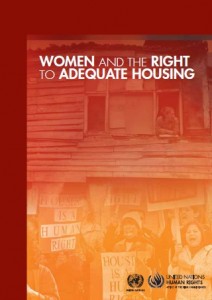The right to adequate housing is clearly recognized in international human rights law, including in the International Covenant on Economic, Social and Cultural Rights, which provides for “the right of everyone to an adequate standard of living for himself and his family including adequate food, clothing and housing, and to the continuous improvement of living conditions” (art. 11.1).
Yet, well over one billion people live in precarious conditions in slums and informal settlements threatening their health and even their survival. In addition, some 100 million are homeless on any given day. Further millions are forcibly evicted or displaced from their homes every year. A gender analysis indicates that women are particularly affected and the present publication aims at shedding some light on the main underlying reasons for this situation.

This publication made by the OHCHR provides an overview of the meaning, intent and implications of the human right to adequate housing, and illustrates de jure and de facto obstacles to women worldwide enjoying this right effectively.
Numerous human rights mechanisms have over the years drawn attention to the effects of gender inequality and discrimination on women’s enjoyment of the right to adequate housing. In 2002, the United Nations Commission on Human Rights tasked the first Special Rapporteur on adequate housing, Mr. Miloon Kothari, with reporting on women and adequate housing, and decided to keep the issue of women’s equal ownership of, access to and control over land and the equal rights to own property and to adequate housing on its agenda.
This publication distils his findings on women’s rights, based on regional consultations with civil society between 2002 and 2006, country missions, testimonies and information from local grass-roots groups. It also draws on the work done by the second Special Rapporteur on adequate housing, Ms. Raquel Rolnik, appointed in 2008. She initiated a web-based worldwide consultation on women and the right to adequate housing and, in 2012, she presented the results in her report to the Human Rights Council. Her work on the impact of the financial crisis on the right to adequate housing and on climate change is also pertinent to an analysis of women and the right to adequate housing.
The work of other United Nations human rights mechanisms, such as the Committee on Economic, Social and Cultural Rights and the Committee on the Elimination of Discrimination against Women, is also covered in this publication.
Source: OHCHR
To download the publication, click below.
Leave a Reply